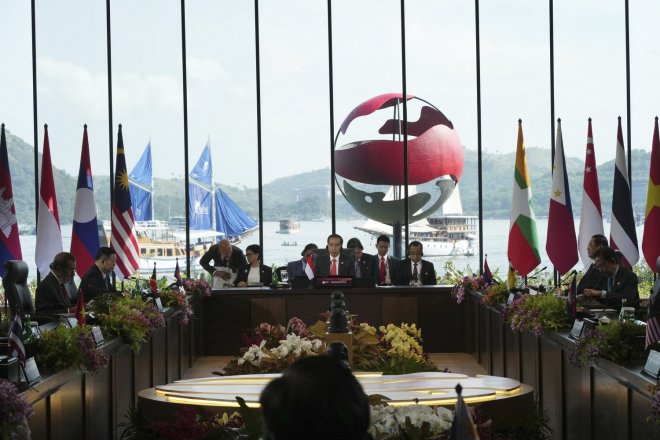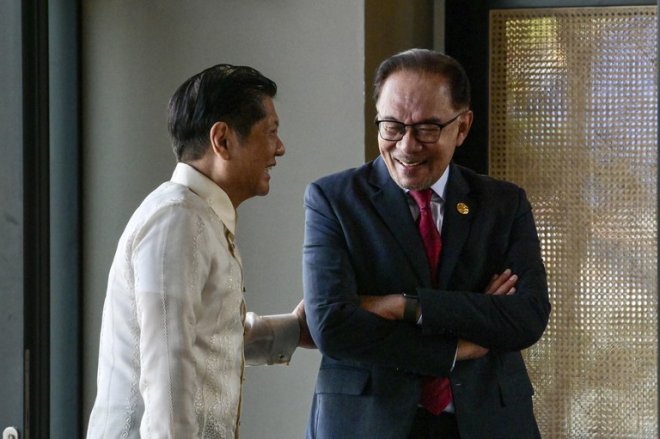
ASEAN leaders condemned a weekend attack on a convoy carrying regional diplomats and aid workers in Myanmar, as they opened a summit on Wednesday amid escalating violence in the Southeast Asian country under military rule.
The meeting of government leaders from the Association of Southeast Asian Nations began in Labuan Bajo, a picturesque seaside town on the Indonesian island of Flores, as pressure mounted on the 10-nation bloc to take firm action on member-state Myanmar. The country has been ravaged by bloodshed since the military seized power from an elected government more than two years ago and unleashed a brutal crackdown on dissent.
In a joint statement, leaders of the regional bloc said they “condemned the attack” on a humanitarian convoy in Myanmar’s Shan state on Sunday and “underlined that the perpetrators must be held accountable.”
Indonesia President Joko “Jokowi” Widodo, this year’s chair of ASEAN, urged members of the bloc to unite in the face of challenges.
“At the moment, the global economy has not fully recovered. Major power rivalries continue to sharpen. The global dynamic becomes more unpredictable,” he said in a speech to open the summit.
“Will ASEAN remain a spectator? Will ASEAN stay silent? Furthermore, will ASEAN be capable of being the engine for peace and economic growth?” he asked. “I am confident that we are certain ASEAN is capable, as long as we hold the key element: ASEAN unity.”
In their collective statement, the Southeast Asian leaders expressed support for efforts by Jakarta to push for the implementation of a five-point peace plan, which ASEAN and Myanmar’s military rulers had agreed to during an emergency summit in April 2021.
The five-point consensus called for an immediate cessation of violence in Myanmar, constructive dialogue among all parties, appointment of an ASEAN special envoy, provision of humanitarian assistance and a visit by an ASEAN delegation.
The junta has largely ignored the plan, prompting ASEAN to bar its leaders from attending the group’s summits.
ASEAN’s founding charter established the group’s principles of consensus and non-interference in its members’ affairs. This has led to criticism of ASEAN as being ineffective.
Among the critics is Anwar Ibrahim, the prime minister of Malaysia, who was at the summit in eastern Indonesia.
On Wednesday, he called for the five-point plan to be implemented in its entirety.
“Malaysia is disappointed that there continues to be a lack of meaningful and real progress in the implementation of the 5PC [five-point consensus],” Malaysian state media quoted Anwar as saying.
 Philippine President Ferdinand Marcos Jr. (left) talks with Malaysian Prime Minister Anwar Ibrahim during the 42nd ASEAN Summit in Labuan Bajo, East Nusa Tenggara, Indonesia on May 10, 2023. Bay Ismoyo/pool via AP
Philippine President Ferdinand Marcos Jr. (left) talks with Malaysian Prime Minister Anwar Ibrahim during the 42nd ASEAN Summit in Labuan Bajo, East Nusa Tenggara, Indonesia on May 10, 2023. Bay Ismoyo/pool via AP
Analysts: Deadlines, more intense pressure needed
The violent incident in Shan state took place as an ASEAN convoy was delivering humanitarian aid to Hsihseng township. Diplomats from Indonesia and Singapore were traveling with the convoy when it came under gunfire.
There were no reports of injuries in the shooting, which the Myanmar military blamed on anti-junta forces. The opposition to the junta denied any involvement, according to reporting by Radio Free Asia, a news service affiliated with BenarNews.
Marina Ika Sari, a researcher at the ASEAN Studies Program of The Habibie Center, a think-tank in Jakarta, said the bloc should set a timetable to make the five-point peace plan work.
“What is needed is a practical plan – short-term, medium-term, long-term, with targets and timelines,” she told BenarNews.
She also said that ASEAN should discuss how to protect foreign diplomats and aid workers who are at risk in Myanmar.
“The security protection of civilians such as foreign diplomats and humanitarian workers in Myanmar is an important issue to be discussed after the attack,” she said.
Muhammad Waffaa Kharisma, an ASEAN researcher at the Jakarta-based Centre for Strategic and International Studies (CSIS), said the situation in Myanmar was no longer only a domestic political issue.
“It has degenerated into a civil war, with spillover effects such as refugees and transnational crimes,” he told BenarNews.
Kharisma acknowledged that the consensus system limits ASEAN in what the bloc can do. In his opinion, barring Burmese military leaders from summits is not enough to change their behavior.
“More varied and intense pressure is needed,” he said.
Myanmar’s military has faced widespread resistance from pro-democracy protesters, ethnic armed groups and other anti-coup forces since seizing power in February 2021.
The ASEAN summit was also expected to address issues such as a roadmap to Timor Leste’s full membership in the bloc, the South China Sea disputes and maritime security as well as the promotion of human rights and democracy in the region.
In his opening remarks, Jokowi said ASEAN, which has a combined population of about 650 million and a gross domestic product of about U.S.$3 trillion, had major assets as the “epicenter of growth,” such as a fast-growing economy, a young and dynamic workforce and a stable political environment.
He urged the leaders to work together to strengthen economic integration, inclusive cooperation, regional health architecture, food security, energy resilience and financial stability.
Tria Dianti in Jakarta and Iman Muttaqin Yusof in Kuala Lumpur contributed to this report. BenarNews is an RFA-affiliated news service.
